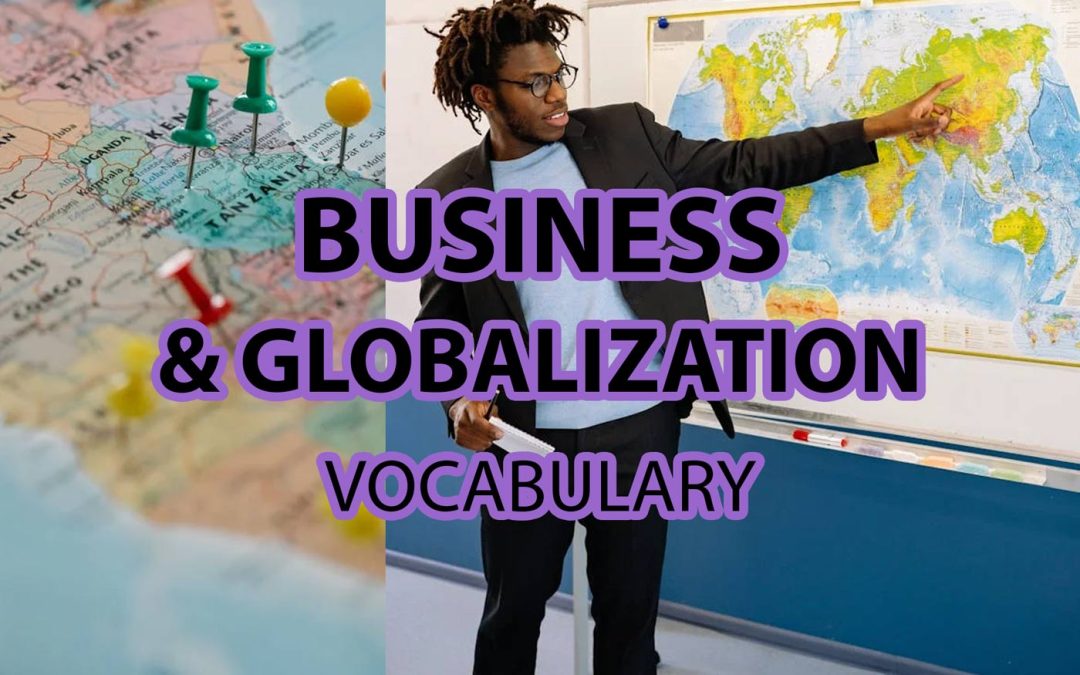The world of finance, business and international trade are complex and the ability to discuss these fields is a priority for anyone working in economics, or anyone studying advanced language use.
Are you concerned about “outsourcing” or “global supply chains?” Does “protectionism” work in an era where we increasingly rely on the benefits of globalization? Let’s look at some key vocabulary.
As a teacher with business English experience I find this topic compelling. Some concepts are very hot in terms of everyday usage in media and business settings. Many people, for one example, are interested in “blockchain” which is part of the conversation around crypto currencies. Of course AI is a relevant concept that is present in economic discussions about creation of text, images and even computer code to power advanced technologies.
For students studying business and globalization, it’s helpful to know terms and phrases that capture economic, cultural, and strategic aspects of global business. Here are some useful expressions:
Globalization Concepts
- Global Supply Chain – The interconnected network of production, distribution, and shipping of goods across multiple countries.
- Outsourcing – Contracting business processes or services to third-party providers, often in other countries, to reduce costs.
- Offshoring – Moving part of a business’s operations to another country to benefit from lower costs, especially labor.
- Emerging Markets – Economies that are transitioning from developing to developed, presenting new growth opportunities (e.g., BRICS countries).
- Comparative Advantage – The ability of a country to produce goods or services at a lower opportunity cost than others, promoting trade benefits.
- Global Value Chain (GVC) – Different stages of production located across countries, emphasizing each country’s specific contribution.
- Localization – Adapting products or services to meet the specific needs of local markets.
- Cultural Intelligence (CQ) – The ability to relate to and work effectively across cultures, a critical skill in international business.
- Sustainability – Meeting present needs without compromising the ability of future generations, often key in corporate social responsibility (CSR).
- Ethical Sourcing – Ensuring products are obtained in a responsible and sustainable way, considering the well-being of workers and the environment.
Economic Terms
- Foreign Direct Investment (FDI) – Investment from one country into another, often through purchasing or building facilities.
- Trade Balance – The difference between a country’s exports and imports, which can impact its economic health.
- Protectionism – Government policies aimed at restricting imports to protect domestic industries from foreign competition.
- Trade Liberalization – The process of reducing tariffs and other trade barriers to encourage international trade.
- Economies of Scale – Cost advantages that enterprises obtain due to their scale of operation, which can lower per-unit costs.
Business Strategy
- Competitive Advantage – Unique assets or capabilities that give a business an edge over competitors, often in the global market.
- Market Entry Strategy – The plan businesses use to enter a new international market (e.g., exporting, franchising, joint ventures).
- Standardization vs. Adaptation – Deciding whether to keep a product the same in all markets (standardization) or adjust it for each locale (adaptation).
- Global Brand Equity – The value and strength of a brand in the international market, impacting customer loyalty and pricing power.
- Mergers and Acquisitions (M&A) – Strategies for growth, either by merging with or acquiring other companies, often across borders.
Cultural and Ethical Considerations
- Cultural Sensitivity – Awareness and respect for cultural differences, essential for building successful international business relationships.
- Corporate Social Responsibility (CSR) – Business practices involving initiatives that benefit society, often seen as critical in global markets.
- Labor Arbitrage – Taking advantage of cost differences in wages between countries to minimize expenses.
- Intellectual Property Rights (IPR) – Protecting innovations and ideas across borders, often challenging in the global marketplace.
- Transparency and Accountability – Being open and answerable to stakeholders, which can strengthen a business’s reputation worldwide.
Modern Trends and Technology
- Digital Transformation – Integrating digital technology into business, changing operations, and delivering value on a global scale.
- Blockchain Technology – A decentralized ledger technology that’s revolutionizing global supply chains, payments, and contracts.
- Artificial Intelligence (AI) in Global Markets – Using AI for customer insights, predictive analytics, and operational efficiency internationally.
- Global Workforce – Employees spread across different countries, often managed through remote work and collaboration tools.
- Gig Economy – A labor market characterized by short-term contracts or freelance work rather than permanent jobs, increasingly global.
Each of these terms will help students understand and discuss global business issues, from strategic planning to navigating cultural differences.
What do you think of these terms? Have you used any in your work or studies? I find some of these expressions extremely pertinent to today’s job market. Many people are forced to work in what is called the “gig economy.” Many people work from home and participate as members of a “global workforce,” collaborating with colleagues all around the world.
Let me know what you think.
Hire a teacher-tutor from Toronto!

Looking for a tutor to help you improve your English? Interested in upgrading your general business and communication skills? Consider hiring Mike Simpson, a creative teacher, trainer and educator, from Toronto Canada. Mike has worked with students from all over the world.
You can study in person in downtown Toronto or around the GTA, or study with Mike online from the comfort of your home.
Please Contact Mike to ask about availability and study subjects.








